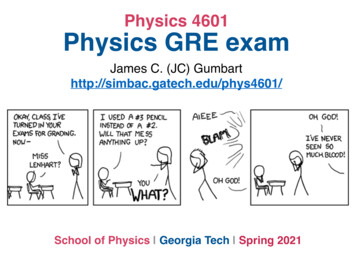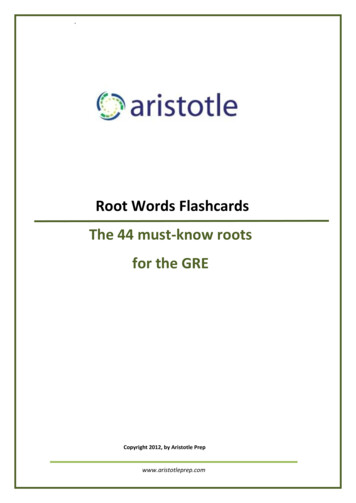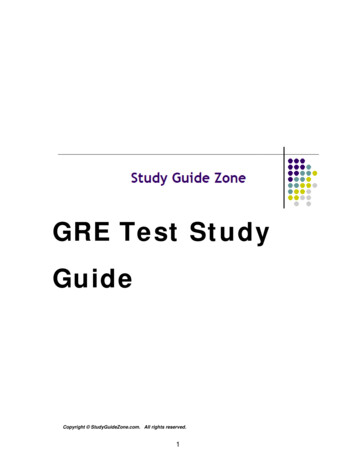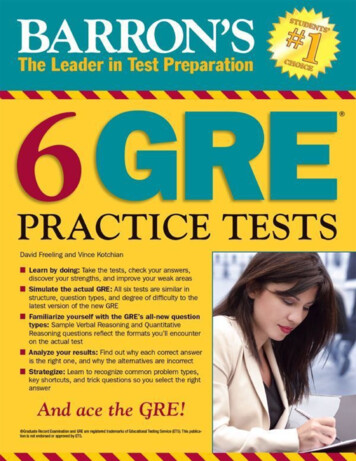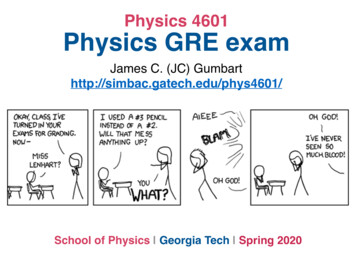
Transcription
Physics 4601Physics GRE examJames C. (JC) Gumbarthttp://simbac.gatech.edu/phys4601/School of Physics Georgia Tech Spring 2020
What is the GRE? The Graduate Record Examination (GRE) is a set of standardizedtests often used for entry to graduate schoolThe General GRE test, which is required by most schools, hasthree parts, quantitative (math), verbal (words and stuff), andanalytical writing (can you combine words into sentences)Subject GRE tests are used for specific fields (Biology, Chemistry,Literature, Math, Physics, Psychology) and are used more or lessoften, depending on the area
Why GRE?
Why GRE?Change can be nt
What is the Physics GRE? The Physics GRE is 170 minutes and has 100 multiple-choice(five-option) questionsIt spans practically all of physics with the following breakdown: Classical mechanics (20%) Electromagnetism (18%) Optics and wave phenomena (9%) Thermodynamics and statistical mechanics (10%) Quantum mechanics (12%) Atomic physics (10%) Special relativity (6%) Laboratory methods (6%) Specialized topics (9%)https://en.wikipedia.org/wiki/GRE Physics physics
What is the Physics GRE?1. CLASSICAL MECHANICS — 20%(such as kinematics, Newton's laws, work and energy, oscillatory motion, rotational motion about a fixed axis, dynamics of systems ofparticles, central forces and celestial mechanics, three-dimensional particle dynamics, Lagrangian and Hamiltonian formalism,noninertial reference frames, elementary topics in fluid dynamics)2. ELECTROMAGNETISM — 18%(such as electrostatics, currents and DC circuits, magnetic fields in free space, Lorentz force, induction, Maxwell's equations andtheir applications, electromagnetic waves, AC circuits, magnetic and electric fields in matter)3. OPTICS AND WAVE PHENOMENA — 9%(such as wave properties, superposition, interference, diffraction, geometrical optics, polarization, Doppler effect)4. THERMODYNAMICS AND STATISTICAL MECHANICS — 10%(such as the laws of thermodynamics, thermodynamic processes, equations of state, ideal gases, kinetic theory, ensembles,statistical concepts and calculation of thermodynamic quantities, thermal expansion and heat transfer)5. QUANTUM MECHANICS — 12%(such as fundamental concepts, solutions of the Schrödinger equation (including square wells, harmonic oscillators, and hydrogenicatoms), spin, angular momentum, wave function symmetry, elementary perturbation theory)6. ATOMIC PHYSICS — 10%(such as properties of electrons, Bohr model, energy quantization, atomic structure, atomic spectra, selection rules, black-bodyradiation, x-rays, atoms in electric and magnetic fields)7. SPECIAL RELATIVITY — 6%(such as introductory concepts, time dilation, length contraction, simultaneity, energy and momentum, four-vectors and Lorentztransformation, velocity addition)8. LABORATORY METHODS — 6%(such as data and error analysis, electronics, instrumentation, radiation detection, counting statistics, interaction of charged particleswith matter, lasers and optical interferometers, dimensional analysis, fundamental applications of probability and statistics)9. SPECIALIZED TOPICS — 9%Nuclear and Particle physics (e.g., nuclear properties, radioactive decay, fission and fusion, reactions, fundamental properties ofelementary particles), Condensed Matter (e.g., crystal structure, x-ray diffraction, thermal properties, electron theory of metals,semiconductors, superconductors), Miscellaneous (e.g., astrophysics, mathematical methods, computer applications)In each category, the subtopics are listed roughly in order ofdecreasing importance for inclusion in the test.
What is the Physics GRE? It’s offered only three times per year: September, October, and AprilYou register at least a month in advance, but don’t wait until thedeadline as testing centers fill up! (some student have had to travelto, e.g., Athens because Atlanta test centers were full)Scores take another month to become availableMany students register for both September and October test dates toincrease their chances of getting a good scoreEach test costs 150, which includes sending the scores to fourschoolsSending to additional schools costs 27 eachThe ScoreSelect option allows you to send only your best score to aschool (although some schools may ask for all scores anyway)
Why physics GRE?“ despite a large sample size and wide dynamicrange, we do not find a statistically significantrelationship between GRE Physics (GRE-P) SubjectTest scores and Ph.D. ent/5/1/eaat7550
Why physics GRE?Only 1/3 of schools require it and 1/4recommend itNearly half of schools don’t want/need PZkZ3CM469ru3Uwk4584CmzZyAVVwQJJcyc/edit
Scores Every Subject Test yields a total score on a 200to 990 score scale, in 10-point increments. Scores get assigned a percentile representingwhat fraction of people for which you scoredhigher (this will vary a bit from year to year) For 20,700 people who took the Physics GREbetween July 2015 and June 2018, the averagescore was 712 /- 160https://www.ets.org/s/gre/pdf/gre guide table2.pdf
Scores The number of correct answers willdetermine your score for a given test Incorrect answers are NOT penalized(this wasn’t always the case - bewareoutdated advice!) For the 2013 practice exam, getting84/100 was good enough for a perfectscore (990) getting 50/100 correct on this test is a650 - a respectable score (but notcompetitive for top schools)
Scores While some schools publish minimum scores, they aren’t alwaysstrictly enforced (GT did not enforce its own minimum)To get an idea, you can look at the physicsgre.com forum, e.g.:https://physicsgre.com/viewtopic.php?t 145205
Resources for preparation links to various content on the course website,including old tests for practice with solutions http://simbac.gatech.edu/phys4601/practice tests aremost representativebut to supplement, abook like this one canbe ics-gre/
Strategies READ all the sources I have provided/linked toDo ALL 500 practice exam problems AND understand them Note: older practice exams are harder than current ones!Time is short ( 100 seconds/question)! Look for/learnshortcuts for solving problemsIf you have taken sufficient courses, consider taking the Apriltest - then you can decide if you still want to take a secondtest in OctoberNext class, we will go over example problems and strategiesfor solving them!Next, next class, you will take a sample (1/3) Physics gre/
What is the GRE? The Graduate Record Examination (GRE) is a set of standardized tests often used for entry to graduate school The General GRE test, which is required by most schools, has three parts, quantitative (math), verbal (words and stuff), and analytical writing (can you combine words into sentences) Subject

